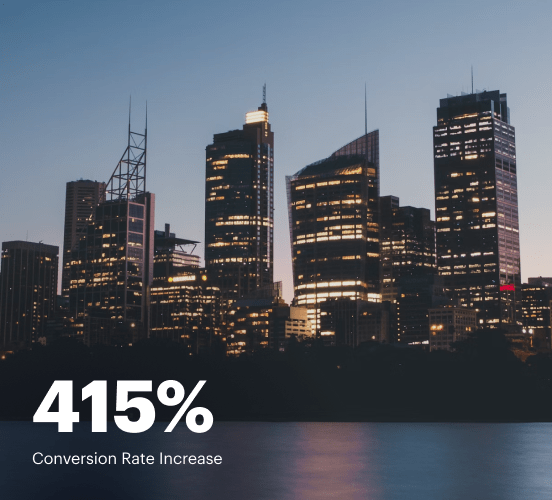How Shopify vs. Paperform vs. Instapage stack up against each other
Compare Instapage with Shopify and Paperform to create high-converting landing pages. With personalization, optimization, and collaboration tools, Instapage helps you deliver experiences that drive results.
Get startedSee how Instapage stacks up against the competition
| Feature | Instapage | Other builders |
| Drag-and-Drop Tools | ||
| Conversion-optimized templates | ||
| Manual and AI-powered A/B Tests | ||
| AI content suggestions | ||
| Popups and sticky bars | ||
| Canvas and grid blocks | ||
| Reusable and global elements | ||
| Form and popup builders | ||
| Built-in Heatmaps | ||
| Central analytics dashboard | ||
| Ad-to-page personalization and collections | ||
| Contacts, lists, and email | ||
| Dedicated, full-service CRO experts | ||
| Enterprise-ready platform |
Leading the way in building high-performing landing pages





Why Instapage is the smarter choice for your campaigns
Get everything you need to build, scale, and optimize high-converting landing pages—without coding.
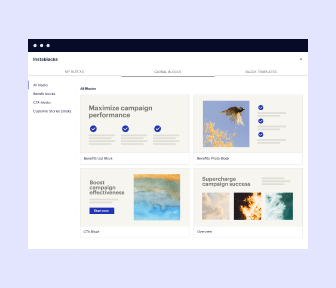
Easier page building without coding
Instapage offers a flexible and seamless page creation experience with a library of 500+ conversion-focused layouts, Instablocks®, a drag-and-drop builder, and AI content generation. With technologies like Thor Render Engine®, you can create on-brand, mobile-responsive landing pages that load quickly and start converting during initial visitor clicks.
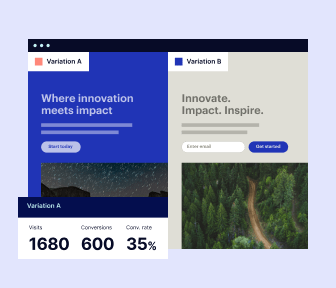
More insights — better results
Instapage lets you see in detail how each landing page experience and variation is performing so you can make targeted changes that boost page conversions. Use heatmaps for a better understanding of on-page activities, run A/B tests and AI-assisted experiments, and then track and evaluate results within robust analytics dashboards.
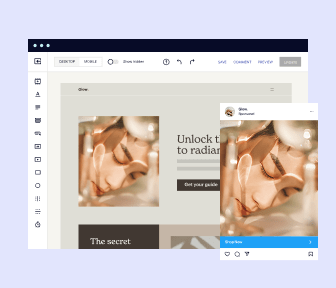
More personalized experiences
Instapage lets you quickly create high-performing landing pages tailored to each of your ad campaigns. Deliver personalized experiences for distinct audiences using dynamic text replacement. Effortlessly align specific advertisements to unique pages with AdMaps. Monitor audience-level metrics using our advanced data tools.
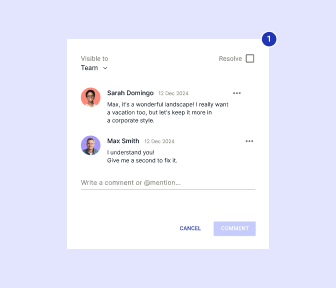
Built-in collaboration
Instapage collaboration capabilities bring your entire team together to speed up the process of landing page review, approval, and launch. No more frustrating and unnecessary revisions or edits scattered across emails. Provide instant feedback, conduct real-time page edits, and securely share your pages with outside stakeholders.
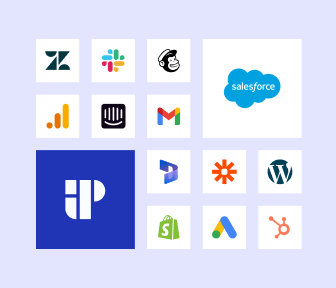
Free up time for your business
Invest time into business growth, not busy work. Launch landing pages faster with reusable forms and templates. Build once, reuse forever.
Explore all integrations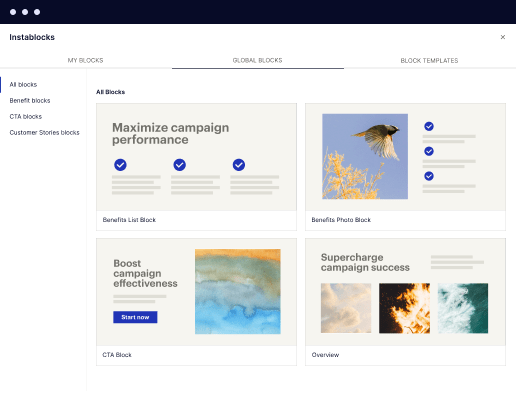
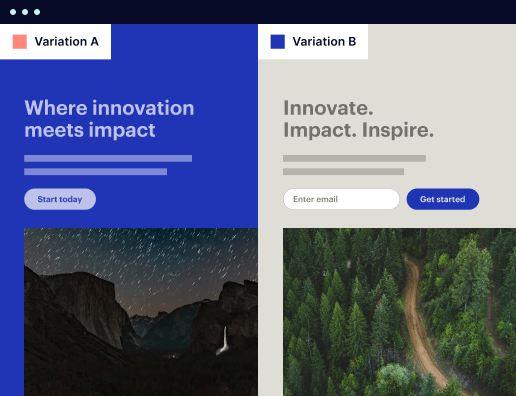
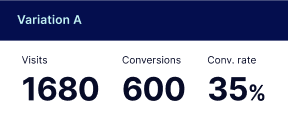
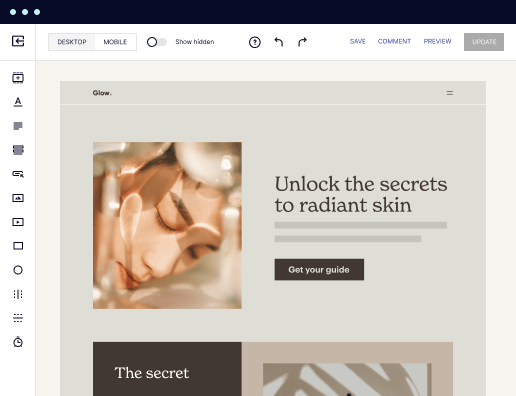

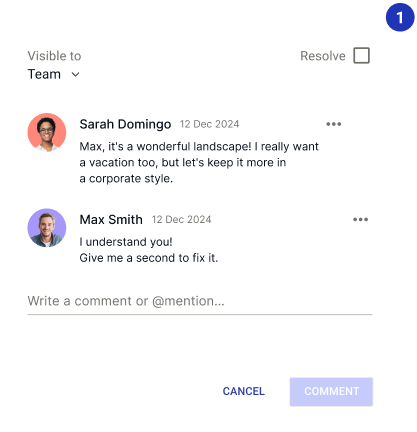
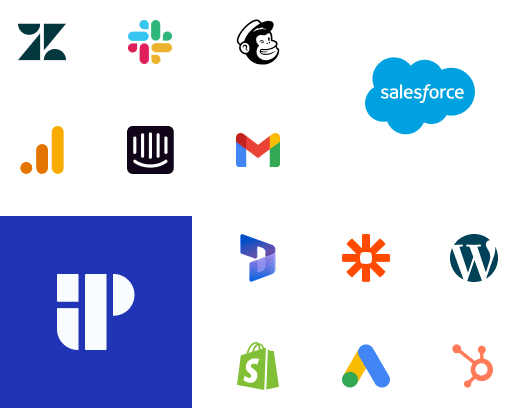
Easier page building without coding
Instapage offers a flexible and seamless page creation experience with a library of 500+ conversion-focused layouts, Instablocks®, a drag-and-drop builder, and AI content generation. With technologies like Thor Render Engine®, you can create on-brand, mobile-responsive landing pages that load quickly and start converting during initial visitor clicks.
More insights — better results
Instapage lets you see in detail how each landing page experience and variation is performing so you can make targeted changes that boost page conversions. Use heatmaps for a better understanding of on-page activities, run A/B tests and AI-assisted experiments, and then track and evaluate results within robust analytics dashboards.
More personalized experiences
Instapage lets you quickly create high-performing landing pages tailored to each of your ad campaigns. Deliver personalized experiences for distinct audiences using dynamic text replacement. Effortlessly align specific advertisements to unique pages with AdMaps. Monitor audience-level metrics using our advanced data tools.
Built-in collaboration
Instapage collaboration capabilities bring your entire team together to speed up the process of landing page review, approval, and launch. No more frustrating and unnecessary revisions or edits scattered across emails. Provide instant feedback, conduct real-time page edits, and securely share your pages with outside stakeholders.
Free up time for your business
Invest time into business growth, not busy work. Launch landing pages faster with reusable forms and templates. Build once, reuse forever.
Explore all integrationsGet started with Instapage in a few steps
-
Create your Instapage account
Start with Instapage by signing up via Google or your email. You'll get access to a free 14-day trial to discover Instapage capabilities. Feel free to cancel anytime during the 14-day trial if you decide that our product is not suitable for your business. -
Build and personalize your page
Create your first landing page from scratch or choose a template from 500+ customizable layouts. Use the drag-and-drop builder to add page elements, fonts, and backgrounds, refine content with AI, or add custom HTML, Javascript, and CSS. -
Review and make edits
Collaborate on page designs and streamline review processes. Invite your team members and stakeholders to review, edit, and provide feedback on your landing page. Collaborate knowing your page is confidential and only accessible to authorized users. -
Publish and track page performance
Publish your page to a domain or custom URL. Connect your pages to the ads you've created and track page performance within the analytics dashboard, run A/B tests and AI experiments, analyze results, and continuously optimize your landing page to maintain high conversions.
Instapage vs. Shopify vs. Paperform – The Landing Page Showdown
Picture this: choosing the right landing page builder is like assembling your ultimate dream team for a marketing campaign. You need the heavy hitters that can boost conversions, limit expenses, and create enticing landing page experiences. In this friendly rivalry between Instapage, Shopify, and Paperform, we’ll explore who packs the biggest punch in user experience and conversion optimization. Each contender brings its unique strengths to the arena, and by the end, you’ll know which tool aligns best with your goals. So, grab your coffee and settle in, because this comparison promises to be as insightful as it is entertaining. Our spotlight today will shine especially brightly on Instapage, which empowers marketers to reduce costs, grow conversions, and deliver relevant landing page experiences that increase brand trust, customer loyalty, and conversion rates.
Meet the Competitors – A Brief Introduction
Entering the digital marketing arena are our three contenders: Instapage, Shopify, and Paperform. Each platform shines in various aspects of online marketing but claims its fame in the realm of landing pages. Instapage is widely known for its superb customization options, quality A/B testing features, and user-friendly interface tailored for marketers. Shopify stands tall in the e-commerce sector, providing robust online selling capabilities alongside its basic landing page functionalities. On the other hand, Paperform offers a unique form-based approach, turning forms into seamless landing pages while maintaining ease of use. Together, these platforms create a diverse landscape, each with something valuable to offer marketers looking to enhance conversion rates.
Round One – Feature Comparison Extravaganza
Template Diversity and User-Friendliness
Kicking off our comparison, each platform presents a unique offering in terms of templates and overall ease of use. Instapage is noted for its extensive library of responsive templates designed specifically for conversions. Users can easily customize these templates with a drag-and-drop interface, allowing quick deployment and testing. Conversely, Shopify offers a more limited set of templates primarily focused on e-commerce features, which may not cater to marketers exclusively looking for high-converting landing pages. Paperform takes an innovative approach by allowing users to create landing pages from pre-existing forms, making it incredibly user-friendly, especially for those lacking technical skills. However, the template variety may not match Instapage's level of customization. Overall, this round sees Instapage leading the charge with its robust feature set designed specifically for marketers.
Instapage: Customization Champion and Conversion Boosting Tools
When it comes to customization and conversion optimization, Instapage stands out as the ultimate tool for marketers. The platform offers a highly sophisticated yet user-friendly drag-and-drop feature, enabling users to create personalized landing pages that align with their brand identity. Instapage goes beyond just aesthetics; it integrates advanced features such as A/B testing, heatmaps, and detailed analytics to track performance metrics effectively. These tools empower marketers to make data-driven decisions, that drive conversion improvements. The ability to seamlessly integrate with various CRM and email marketing tools further solidifies Instapage's position as a valuable asset for any marketing team seeking measurable success.
Round Two – The Speed and Performance Showdown
As we shift gears, let’s talk about speed – a crucial element for any successful landing page. Think of it as waiting in line at a coffee shop. Nobody enjoys a slow barista when a delicious coffee is just a few moments away! Likewise, a slow-loading landing page can drive visitors away before they even see what you have to offer. Therefore, it's essential to analyze how each platform holds up in terms of performance.
Instapage's Speed Benefits:
- Instapage optimizes landing page load times with built-in hosting capabilities.
- Fast server response times ensure visitors experience swift navigation.
- Advanced caching technology keeps landing pages loading promptly.
- Automated A/B tests run on speedy servers to provide real-time results.
Shopify's Speed Advantages:
- Optimized for online stores, leading to efficient checkout processes.
- Hosting solutions that manage high traffic volumes during promotions.
- Integrated CDN helps deliver faster loading on a global scale.
Paperform's Performance Perks:
- Form-based designs load quickly as they rely on essential functionalities.
- Automatic mobile optimization enhances performance on mobile devices.
- Seamless integration with various apps allows lightning-fast form uploads.
- Clean coding practices keep the back end optimized for quick loading.
In the realm of speed and performance, it's evident that all three contenders have beneficial aspects. Instapage comes out on top, focusing exclusively on landing page usability and quick loading times – a crucial factor in improving conversion rates.
Round Three – Usability and User Onboarding
Venture into usability and the learning curve each platform presents. Instapage has garnered praise for its intuitive design that welcomes both newcomers and seasoned marketers. The user interface is clean, guiding users through the process of designing landing pages without overwhelming them. Shopify similarly offers solid usability, aligned with its e-commerce focus, but can pose a learning curve for users solely focused on creating landing pages. On the other hand, Paperform thrives on simplicity with an easy onboarding process that turns non-techies into adept users. Each platform takes a slightly different approach, but all prioritize user experience, fostering growth into expert status as familiarity builds.
Round Four – Customer Support and Assistance
When it comes to customer support, think of each platform's support team as the trusty sidekicks who are always a call away. Instapage provides multiple channels, including live chat, email, and an extensive knowledge base to address queries promptly. Shopify adopts a similar tactic, offering 24/7 support through chat and email, making it a reliable partner for users needing help. Paperform builds a tight-knit community with forums and video tutorials, enhancing the support experience by encouraging user-to-user interaction. Each platform acknowledges the importance of customer support, ensuring marketers feel valued and supported throughout their journey.
Round Five – Comparing Pricing and Plans
Turning our attention to pricing structures, each platform offers different models to cater to various budgets and needs. Instapage, while slightly higher priced, makes up for it with extensive features designed to maximize conversions effectively. Shopify presents flexible plans that expand based on business needs, though its focus remains on e-commerce. Meanwhile, Paperform has a straightforward pricing model focused on its form and landing page capabilities, benefiting those with specific needs but limited budgets. Each offer has its merits, so evaluating the right choice critically based on your unique requirements is essential.
In closing, while all three platforms showcase their strengths, the ideal choice indeed hinges on your business objectives. Consider what features resonate most with your requirements, whether it's advanced customization, pricing flexibility, or stellar support. We wholeheartedly recommend giving Instapage a spin through its free trial, where you can experience its powerful features firsthand and enhance your landing page strategy.



